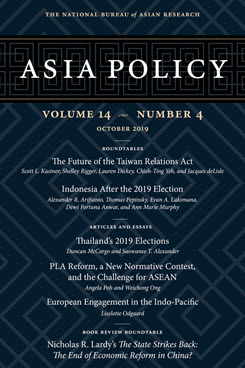Thailand's 2019 Elections
A State of Democratic Dictatorship?
This essay argues that Thailand’s 2019 elections served to institutionalize the military junta that seized power in 2014 in a system of facade democracy.
EXECUTIVE SUMMARY
MAIN ARGUMENT
Thailand’s elections on March 24, 2019, were supposed to restore the country to parliamentary democracy following a military coup d’état in May 2014. The junta repeatedly delayed holding the elections, and the new 2017 constitution deployed an unusual voting system combined with interim provisions that allowed the appointed Senate to share in selecting the prime minister, changes that favored the ruling military clique. An important opposition party, Thai Raksa Chart, was dissolved by the Election Commission during the campaign on highly dubious legal grounds. The pro-military Palang Pracharat Party was created as a vehicle to allow junta members to continue in office beyond the elections, and succeeded in taking away millions of votes from the long-standing conservative and royalist Democrat Party. Meanwhile, the previously dominant Pheu Thai Party—closely associated with former prime ministers Thaksin and Yingluck Shinawatra—was challenged by the upstart Future Forward Party, which attracted huge numbers of younger voters with its anti-junta stance. Ultimately, the Democrats entered a fractious multi-party coalition with Palang Pracharat, made possible only when the Election Commission controversially changed the rules for calculating the allocation of party-list seats. As a result, coup leader General Prayuth Chan-ocha was reappointed as prime minister. The palpably unfair election outcome has effectively perpetuated military rule and left those who had supported opposition parties intensely frustrated.
POLICY IMPLICATIONS
- Amendment of the 2017 constitution should be explored, especially concerning the mixed-member apportionment voting system that had a distorting effect on poll results.
- Election rules should be clearly defined in advance: the Election Commission should not be entitled to change the formula for allocating party-list seats after polling has closed.
- There is a strong case for preventive diplomacy. The U.S. and other allies of Thailand should closely monitor the unfolding domestic political situation and urge the authorities not to abuse the legal system further to harass opposition parties.
Duncan McCargo is Director of the Nordic Institute of Asian Studies and Professor of Political Science at the University of Copenhagen.
Saowanee T. Alexander is Assistant Professor in the Faculty of Liberal Arts at Ubon Ratchathani University.
About Asia Policy
Asia Policy is a peer-reviewed scholarly journal presenting policy-relevant academic research on the Asia-Pacific that draws clear and concise conclusions useful to today’s policymakers. Asia Policy is published quarterly in January, April, July, and October and accepts submissions on a rolling basis. Learn more


